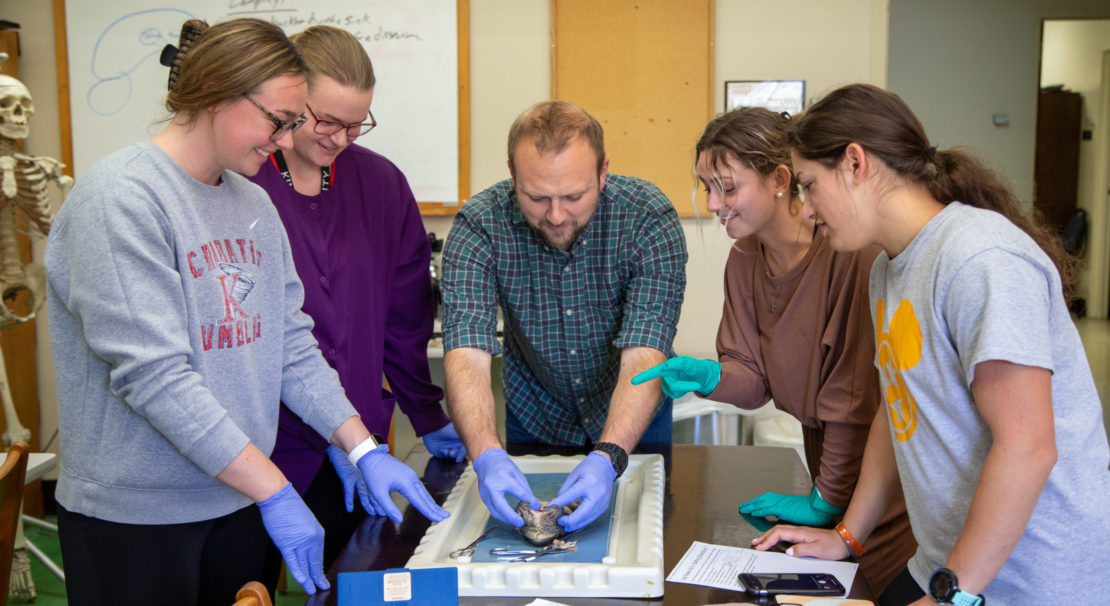 Hands On Teaching
Hands On Teaching
King Graduates are Impacting the World

Overview
The biology program at King strives to serve the mission of King University by educating our students to be stewards of our earth and its people. Students are challenged to develop critical thinking skills, expand their scientific understanding and apply their knowledge in and out of the classroom. This is accomplished by:
Program Highlights
- Highly qualified faculty with broad training backgrounds who are committed to furthering their, and our students, education.
- Small class sizes and one-one-one interactions help faculty and students build strong professional and personal relationships through extensive advising and mentorship.
- Faculty are active on campus advising Women in STEM, EPIK (Environmental Positive Impact at King), King Pre-Professional Club, SLACK, and serving as affiliates to sports teams.
- Students are presented with research, shadowing, and internship opportunities at King University as well as other institutions.
- Students regularly attend and present research at professional meetings of various scientific organizations.
- The annual beginning of the semester picnic and other social events promote an atmosphere of camaraderie and community among biology students and faculty.
- Students are actively involved in volunteer opportunities which benefit both King University and the local community.
- Learning is enhance via field trip opportunities which include but are not limited to the Proton Therapy Center in Knoxville, Quillen College of Medicine Cadaver Lab, Steele Creek Park in Bristol, and the Fossil Museum in Gray, TN.
- Interdepartmental Science Seminar prepares junior and senior level science students to investigate, interpret, and present scientific findings in a public forum.
- Preparation of a final portfolio details each student’s accomplishments.
Bachelor of Science in Biology
The Bachelor of Science in Biology encompasses the study of life in all of its forms. Students learn through rigorous classroom instruction combined with research conducted in campus labs and in the field. The Bachelor of Science in Biology has four tracks to choose from:
- General Biology
- Cell and Molecular Biology
- Bioinformatics
- Pharmacy 3+1
Students interested in a broad understanding and appreciation of botany and zoology are encouraged to consider the General Biology track, while the Cell and Molecular Biology track is designed for those interested in pursuing a career in medicine, pharmacy, biotechnology or biomedical research. The Bioinformatics track, which requires that students minor in Mathematics, will prepare students for graduate school and careers in the fields of genomics, informatics, and biostatistics. King also offers a Pharmacy Dual Degree (Pharmacy 3+1) program, which allows students to earn a Bachelor of Science in Biology after three years of study at King and one year at an accredited school of pharmacy.
Bachelor of Arts in Biology
The Bachelor of Arts in Biology program provides more flexibility than the BS degree program and requires students to earn a minor (often Psychology, Spanish, or Mathematics) which provides students the opportunity to add breadth to their eduction.
Students in King University’s Bachelor of Arts in Biology program have the opportunity to choose from one of the following tracks:
General Biology
General Biology is a good option for students who want a Biology degree yet have the ability to take a wider range of electives. It is suited for those interested in careers as a scientific or pharmaceutical sales representative, lab technician, scientific writer, or public school teacher. Requires a minor.
Human Biology
Human Biology is designed for students interested in pursuing a career as a physician’s assistant or in physical therapy. Requires a minor.
Teacher’s Education
The B.A. in Biology (with Licensure for Grades 6-12) is available as a track of the Biology B.A. major and may be paired with a Secondary Education minor. More information regarding minor and licensure options can be found within the Secondary Education Minor section of the academic catalog. Licensed teachers in secondary education are in great demand in all fifty states, and science is considered a critical need area in K-12 public education by all states.
| Biology Major Careers | |
|---|---|
| Biotechnology | Optometry |
| Conservation Ecology | Pharmaceutical Research |
| Dentistry | Pharmaceutical Sales |
| Environmental Law | Physical Therapy |
| High School Teaching | Research |
| Medical Doctors (MD or OD) | University Teaching |
| Molecular Biology | Wildlife Management |
Biology Coursework
- To view all required courses for a BS in Biology, click here.
- To view all required courses for a BA in Biology, click here.
- For Biology course descriptions, click here.




Laptop Requirement
The Biology program requires a laptop with Microsoft Office 2010 or later, and wireless and webcam capability.